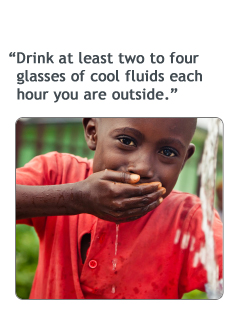
Sure your car, house and office are air conditioned but that doesn’t mean you can ignore the dangers of hot weather – especially this summer as a record breaking heat wave sweeps much of the nation.
In fact, the Centers for Disease Control (CDC) recommend limiting any outdoor activities to morning and evening hours in areas that are experiencing sweltering temperatures. If you must be out in the heat of the day, make sure you rest often in shady areas so your body's internal thermostat has a chance to recover.
Here are more ways to stay safe and keep your cool (as much as possible) this summer.
Drink and drink some more
It’s hot, you’re thirsty and it’s obvious you’ll need to drink more fluids. But don’t underestimate how much water you need to take in when temperatures soar. Did you know that running a few errands in extreme heat – simply walking from your car in a super-hot parking lot to a couple of stores, for example – can leave you dehydrated? The result can be fatigue and headaches. So don’t wait until you feel thirsty to drink water.
The CDC advises increasing your fluid intake, regardless of your activity level, during the sweltering summer months. Drink at least two to four glasses (16-32 ounces) of cool fluids each hour if you are outside and/or physically active.
While it’s always smart to down more water in hot weather, not all liquids are healthy choices. The CDC warns that drinks containing alcohol, large amounts of sugar and/or caffeine can result in excess urination and more dehydration. What’s more, although icy cold beverages may cool you off quickly, they can cause stomach cramps. So think cool, not extremely cold, when it comes to liquid refreshments.
Heavy sweating removes salt and minerals (electrolytes) from your body and, if not replaced, can leave you fatigued and may result in muscle cramps. According to the American College of Sports Medicine, that makes sports drinks (which replace electrolytes lost through perspiration, a good choice during hot weather activities.
 Food safetySummer is time for back-yard barbecues and out-in-nature picnics. However according to the U.S. Department of Agriculture’s Food Safety and Inspection Service (FSIS), it’s also the time of year when food poisoning cases soar. FSIS experts explain that’s because illness-causing bacteria found in food grows extremely fast in hot, humid weather.
Tips to keep food safe:
- During extremely hot weather, pack frozen and perishable items in an ice chest after shopping at the grocery store if you are running additional errands before heading home.
- Put perishable products in the refrigerator as soon as possible after shopping and never leave them at room temperature longer than two hours (or one hour when it's above 90°F).
- Already-hot summertime temperatures spike higher in direct sunlight so store coolers in the shade at picnics.
- Don’t leave food outside a cooler or off the grill more than two hours (one hour when the outside temperature is above 90°F).
- Keep coolers in the air-conditioned part of the car, not the trunk, when traveling with food to a picnic.
- Eat hot take-out food such as fried chicken or barbecue within two hours of purchase or store in your refrigerator for later.
Dress for comfort and protection.
Choose lightweight, light-colored, loose-fitting clothing in hot weather. Outside, don a wide-brimmed hat and don’t forget sunscreen with an SPF of 15 or higher. You want to avoid sunburn’s discomfort and skin aging damage but there’s another reason to steer clear of too much sun – the CDC warns that sunburn affects your body's ability to cool itself.
Always wear sunglasses when you are outdoors but make sure they do more than just look snazzy. Sunglasses should reduce glare and filter out the vast majority of ultraviolent (UV) rays from the sun. Long-term exposure to UV rays can lead to cataracts, vision-robbing macular degeneration and even skin cancer around the eyelids.
Wear sunglasses with a darker tint to block more light if you are at the beach because risk of eye damage from the sun is greater due to reflection off water and sand. How do you know if your sunglasses filter out virtually all UV? Unfortunately, not all manufactures state the amount clearly – so be safe and only buy sunglasses with labels that show they block 99 to 100 percent of both UV-A and UV-B rays.
 More common sense hot weather tips:
- Dress babies and children in cool, loose clothing and keep their heads and faces shaded when outside with hats and/or an umbrella. Never leave youngsters or pets in a parked car – even a few minutes can be deadly.
- Provide plenty of fresh water and shaded areas for outdoor pets.
- Athlete's foot, a fungus-caused skin disease, thrives this time of year in warm, damp areas around swimming pools, showers and locker rooms. If symptoms such as itching, burning and inflamed skin don’t clear up within a week or two of over-the-counter treatment, see your family doctor or podiatrist.
Remember that extreme heat isn’t just uncomfortable, it can literally make you sick:
- Heatstroke is a life-threatening illness in which body temperature rapidly rises to a dangerously high level. Symptoms include dizziness, dry skin, nausea, rapid pulse and dizziness.
- Heat exhaustion may precede heatstroke; symptoms include heavy sweating, rapid breathing and a fast, weak pulse.
- Heat cramps are muscle pains or spasms, sometime severe, that can occur during heavy exercise in hot weather, especially if you are dehydrated.
Anyone experiencing these symptoms needs to move into a cool place, remove any extra layers of clothing, and drink water or a sports drink to replenish the body’s lost fluids. If there’s no improvement within an hour, don’t hesitate to seek medical help or call 911.
|